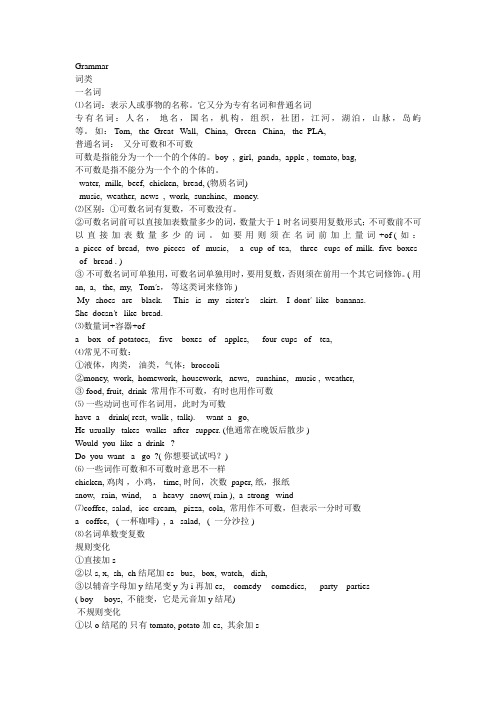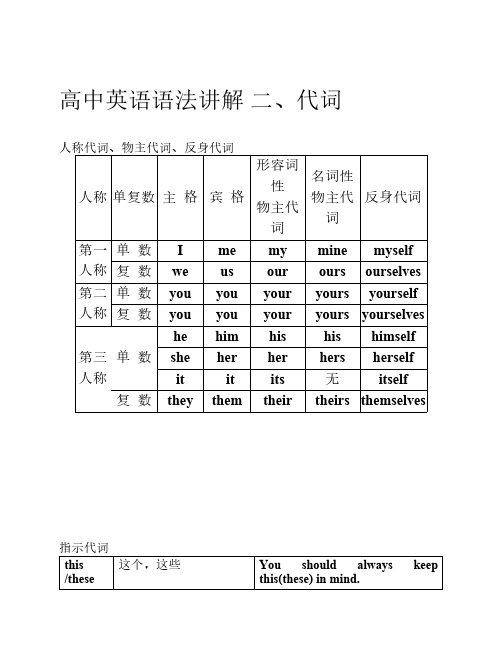二代词
新高考2021届高考英语小题必练2代词

代词在近年高考试题中出现频率非常高。
代词的考查集中在语法填空中,主要考查代词的主格,宾格,形容词性物主代词,名词性物主代词和反身代词。
预计2021年高考命题将继续考查代词在具体、特定语境下的灵活运用。
特别是不定代词one,the one,ones,the ones与指示代词this,that,these,those,it的用法区别,代词的肯定与否定、全部与部分的用法以及反身代词的惯用语。
考点仍然以人称代词、物主代词、指示代词、反身代词等为主。
考点一人称代词(2018·全国卷Ⅲ)When the gorillas and I frightened each other, I was just glad to find________ (they) alive.【答案】them【解析】人称代词作宾语时,要用其宾格。
空格前面是动词find,空格处应用宾格,故填them,指代上文的gorillas。
(2020·全国1卷)Data about the moon’s position, such as how much ice and other treasures it contains, could help China decide whether (it) plans for a future lunar base are practical.【答案】its【解析】根据句子结构和句意可知此处应用形容词性物主代词its 作名词plans 的定语。
考点三指示代词(2019·某某卷)A study shows the students who are engaged in after-school activities are happier than _________who are not.A. onesB. thoseC. theseD. them【答案】B【解析】句意:一项研究表明,参加课外活动的学生比不参加课外活动的学生更开心。
浅谈富二代、官二代

浅谈富二代、官二代一提起官二代、富二代,相信多数人都是仇视的,因为多数人都不是官员、富人。
何谓‚富二代‛?‚富二代‛一词首先出现在《鲁豫有约》,一般指七、八十年代出生,我国改革开放以来最早一代民营企业家‚富一代‛们的子女,他们靠继承家产,拥有丰厚财富。
从其父母成就与素养来看,‚富二代‛一般分为四种类型:知识成功型、纨绔子弟败家型、顺其自然型、父衰子落型。
早在2004年,罗雪挥、潘丽就曾在《新闻周刊》上指出:‚一个靠继承财富,自然拥有资产的新‘富二代’阶层开始随着民企一、二代交班而逐渐形成‛。
‚富二代‛普遍存在一种‚金钱至上‛心理。
近来,‚富二代‛现象引起了社会舆论的广泛关注,最典型的现象就是最近国内发生的一系列飚车案件。
富家子弟飚车,视人民群众为草芥,视法律为空白,拿自己生命当儿戏,对社会和谐进步造成极其恶劣的影响。
只有根治‚富二代‛现象,弱势群体权利才能得到保障,国家法律才有尊严,才能更好地维护社会公平正义和社会稳定,更好地构建和谐社会。
我们每个人也要认真反思这一现象形成的原因,思考其解决办法,并严格要求自己,规范言行,加强修养。
而所谓的‚官二代‛们,较之‚富二代‛们,似乎更占据天时地力人和的优势。
‚官二代‛的身份已经成了一个敏感词,由于他们处于一个特殊的群体,与普通家庭的孩子相比,本身具有很多优势,在他们成长的过程中,这种优势逐渐转变为一种优越感,这就造成,在日常工作生活中他们常常会有一种高人一等的特权思维。
‚富二代‛‚官二代‛现象已日趋明显,其产生的原因是多方面的。
一、是社会原因,改革开放带来了很多的好处,也带来了一些弊端,金钱,权利对社会的冲击是巨大的,而拥有金钱权利所带来的特权更是造成了不公平的出现。
二、是个人原因,主要是二代少爷们的无知造成的,他们的父母在追求到所拥有的东西的过程中还付出了很多,有的还记得自己曾经是个普通人,但他们是生下来就拥有了特权,再加上缺乏管教,因此就产生了这种不公平。
名词表示人或事物的名称它又分为专有名词和普通名词

Grammar词类一名词⑪名词:表示人或事物的名称。
它又分为专有名词和普通名词专有名词:人名,地名,国名,机构,组织,社团,江河,湖泊,山脉,岛屿等。
如: Tom, the Great Wall, China, Green China, the PLA,普通名词:又分可数和不可数可数是指能分为一个一个的个体的。
boy , girl, panda, apple , tomato, bag,不可数是指不能分为一个个的个体的。
water, milk, beef, chicken, bread, (物质名词)music, weather, news , work, sunshine, money.⑫区别:①可数名词有复数,不可数没有。
②可数名词前可以直接加表数量多少的词,数量大于1时名词要用复数形式;不可数前不可以直接加表数量多少的词。
如要用则须在名词前加上量词+of (如:a piece of bread, two pieces of music, a cup of tea, three cups of milk. five boxes of bread . )③不可数名词可单独用,可数名词单独用时,要用复数,否则须在前用一个其它词修饰。
( 用an, a, the, my, Tom's,等这类词来修饰 )My shoes are black. This is my sister's skirt. I dont' like bananas.She doesn't like bread.⑬数量词+容器+ofa box of potatoes, five boxes of apples, four cups of tea,⑭常见不可数:①液体,肉类,油类,气体;broccoli②money, work, homework, housework, news, sunshine, music , weather,③ food, fruit, drink 常用作不可数,有时也用作可数⑮一些动词也可作名词用,此时为可数have a drink( rest, walk , talk). want a go,He usually takes walks after supper. (他通常在晚饭后散步 )Would you like a drink ?Do you want a go ?( 你想要试试吗?)⑯一些词作可数和不可数时意思不一样chicken, 鸡肉,小鸡, time, 时间,次数 paper, 纸,报纸snow, rain, wind, a heavy snow( rain ), a strong wind⑰coffee, salad, ice cream, pizza, cola, 常用作不可数,但表示一分时可数a coffee, ( 一杯咖啡) , a salad, ( 一分沙拉 )⑱名词单数变复数规则变化①直接加s②以s, x, sh, ch 结尾加es bus, box, watch, dish,③以辅音字母加y结尾变y为i再加es, comedy --comedies, party---parties( boy ---boys, 不能变,它是元音加y结尾)不规则变化①以o 结尾的只有 tomato, potato 加es, 其余加s②Chinese, Japanese, sheep, fish , deer, 单数复数一样③foot--feet, tooth----teeth, child---children, man--men, woman, Englishman, ⑲使用名词要注意的几个问题①一些名词只有复数没有单数 people, the police②一些名词常用复数 trousers, shoes, glasses(眼镜), shorts(短裤), jeans③固定搭配中 make friends, by boat, make mistakes,④合成词 a three--year--old boy ( The boy is three years old. )⑤名词作定语修饰其后名词常用单数 (woman, man除外)boy friend, shoe shop, bike factory, ( man doctor, men doctors n )⑳名词的所有格“-----的”结构:①'s 或 s';②A of B (B的A )一般是有生命的用前者,无生命的用后者your brother's name, his father's car, Women's Day , the teachers' desk, the wall of the classroom, 教室的墙 the gate of the park公园的门时间,距离,重量等也常用前者in a few years' time, ten minutes' walk, in today's newspaper有时两者都可China's capital, the capital of China共同所有 This is Tom and Mike's room.分别所有These are Tom's and Mike's shoes.双重所有格 a photo of my sister's二代词:用来代替名词,形容词,或数词等。
2011 2代词

2011届高三英语复习学案2: 代词Step 3 Self-development Fill in the blanks with a proper pronoun:1.We’ve planted a lot of apple trees, but because there has been no rain, _____ have borne fruits.2.Can you leave your children at home alone? Y es, they can take care of ______.3.I asked him for some oil, but he hadn’t______.4.Are the two answers correct? No, _______ is correct.5.I feel a bit hungry. Why don’t you have _____ bread?6.Is______ necessary to tell his father everything?7.As we were asleep, ______of us heard the sound.8.Shall I sit at this end of the boat or the other end? If you keep still, you can sit at _______end.9.________leaves the room last ought to turn off the light.10._______writer is better known in China, Charle Dickens or Mark Twain?11.We couldn’t eat in a restaurant because _____of us had _____money on us.12.I invited Tom and Ann to dinner, but _____of them came.13.There are so many kinds of tape-recorders on sale that I can’t make up my mind _____to buy.14.Although he is wealthy, he spends _____on clothes.15.Would you like some wine? Y es, just a ______.16.Have you finished your report yet?No, I’ll finish it in ______ten minutes.17.They were all tired, but _______of them would stop to take a rest.18.There are many trees on _______side of the street.19.The students are standing on _____sides of the playground.20.This article is easy to understand though there are a ____new words in it.Step 4 Self-appreciationEvery sentence has a mistake, please find them out and correct them.1. Nobody of them understood the old foreigner.2.Whose room is that? It’s my3. This year they have produced fewer grain than they did last year.4. Tom felt that he knew everybody’s business better than they knew it it self..5. I don’t think I can introduce you to the other guests, because I know a few of them.6. “Wonderful,mother!”he said, holding her hands in hers.7. Neither she nor me liked the idea of going on foot.8. The twins are very much alike. I can’t tell one from the another9. Both of his sisters is good at dancing.10. Bill is cleverer than anyone in his class.Step 5 Self-digest : Fill in the blanks with proper words.Bennet Cerf tells this touching story about a bus 1 was bumping (颠簸而行) along a back road in the South.In one seat an old man sat holding a bunch of fresh flowers. Across the aisle (过道) 2 (sit) a young girl whose eyes came back again and again 3 the man’s flowers. The time came 4 the old man to get off. Without much thinking, 5 thrust the flowers into6 love the would like7 to have them. I’ll tell her I gave __ _8 to you.” The girl accepted the flowers, 910. off the bus and walk through the gate of a small cemetery ().(2)When I was growing up I do not recall hearing the words “I love you” from my father. When your father never says ___11___ to you when you are a child, it gets tougher and tougher for him ___12___ (say) those words as he gets ___13___ (old). To tell the truth, I could not honestly remember ___14___ I had last said those words to him either. I decided to set my ego (自我) aside and make the first move. ___15___ some hesitation, in our next phone conversation I blurted out (突然说出) theThere was a silence at the ___16___ end and he ___17___ (awkward) replied, “Well, same back at you!”I laughed and said, “Dad, I know you love me, and when you are ready, I know you___18___ (say) what you want to say.”A few weeks later, Dad concluded our phone conversation ___19___ the words, “Paul, I love you.” I was at work during this conversation and the tears were rolling down my cheeks ___20___ I finally “heard” the love. As we both sat there in tears we realized that this special moment had taken our father-son relationship to a new level.参考答案2011届高三英语复习学案2: 代词9.Whoever 10. Which 11. none; any 12. neither 13.which 14. little 15. little 16. another17. none 18. either 19.all 20. fewStep 4 Self- appreciation: 1. Nobody-None 2. my-mine 3. fewer-less 4. itself-themselves5. a few-few6. hers-his7. me-I8. another-other9. Both-nether / is-are 10.anyone 后加else Step 5 Self- digest1. that/which2. sat3. to4. for5. he6. you7. you8. them9. and 10. get11. them 12. to say 13. older 14. when 15. After 16. other 17. awkwardly 18. will say 19. with 20 as / because。
2代词

12.It is very important for you to go to ___ college.
13.I like this house with a beautiful garden in front, but I don’t have enough money to buy ____. (2009四川卷) it
1. Tom felt that he knew everybody’s business better than they knew it____________. (全国) themselves
2. On my desk is a photo that my father took of _____ when I was a baby. (2010四川卷) me
3. To save class time, our teacher has _____ us students do half of the exercises in class and complete the other half for our homework. (湖南)
4.-Is your camera like Bill’s and Ann’s? -No, but it’s almost the same as________. yours 5.The boy promised______ mother never to his lie toher ______again. (全国)
2. Few pleasures can equal_____ of a cool that drink on a hot day.
3. We needed a new cupboard for the kitchen. So Peter made ______ from one some wood we had.
代组词_代的组词_代字组词.doc

代组词_代的组词_代字组词代组词_代的组词“代”字在开头的词语代沟代行代拜代号代人说项代作代数学基本定理代收货款代工生产代天巡狩代罪羔羊代母产子代理成本代位求偿代马依风代位继承代拆代行代收代付代数方程代代相传代茶饮代漏龙代表团代谢物代数和代理牌代议员代用品代数数代征地代代花代数学代名词代数式代表作代杖代奏代及代售代德代易代身代宗代舍代本代终代金代追代解代跋代购代迁代济代工代指代食代谷代袭代输代马代面代运代纪代位代叙代电代哭代字代赎代英代姓代班代签代翟代越代雁代病代立代室代还代换代茶代籍代斵代语代价代笔代偿代数代培代销代称代职代词代步代序代表代理代替代谢活化代俎越庖代人受过代言人代理人代数函数代父从军代译服务代办代议机关代际流动代邸代匮代议制代人捉刀代马依北风代马望北代北代兴代为说项代为代乳粉代下代书遗嘱代书代杖丹“代”字在结尾的词语累代划时代得代盖代胜代更代燕代地质年代没代中石器时代旧石器时代新石器时代维京时代子孙后代繁衍后代及瓜而代杂交后代冠绝当代摩登时代芳华绝代荫庇后代遗臭千代成年古代拼爹时代石器时代瓜熟而代黄金时代信息时代更新换代妇男时代弥生时代改姓易代风华绝代无可替代多忙时代地质时代传宗接代改朝换代青铜时代铜器时代裸时代讨替代假时代后现代古生代后时代新时代资代惊代继代易代求代晚代补代来代嬗代请代骄代叔代弥代桥代百代受代盛代往代挽代违代圣代明代殊代生代担代希代迭代远代清代上代济代递代商代告代重代倩代躭代遐代命代攘代战代絶代摄代番代地代注代迁代革代借代纂代曩代指代简代顶代畴代运代理代休代皇代顷代奕代祖代昭代季代弃代禅代庖代瓜代现代近代子代交代朝代当代传代亲代替代绝代旷代末代年代古代欲以身代今代天工人代冠代功在当代即代隔代亘代富五代后五代权二代村二代名二代逃二代贪二代二代先代前朝后代前五代漏鼓移则番代列代厌代历代冰河时代兴代六代公侯万代祖宗八代八代乱代两代非常世代世世代代世代不可取代无可取代富不过三代祖宗三代三代千龄万代遗臭万代千秋万代万代七窝八代一代不如一代千禧一代癌症一代租房一代子一代一代九代中生代中代“代”字在中间的词语十代冥王缓步代车商务代表处将李代桃现代汉语词典第四代电子计算机古代英雄的石像商代城墙遗址现代评论派需氧代谢越蛆代庖替代效应粪代谢氮明代鲁绣汉代漆画四代同堂奕代流芳布尔代数次级代谢现代沙发近代树脂时代骄子替代责任透明代理等量代换基础代谢百代过客现代汉语唐代瓷器绝代风华替代资源新故代谢时代气息借箸代筹销售代表年湮代远现代旗袍晋代法规燕雁代飞清代法规明代顾绣时代风貌恒代遗风当代英雄圣代精灵荏苒代谢委托代理李代桃疆悬壶代哭能量代谢税收代征全权代表李代桃僵黨代表末代孙年代戏替代品霸代日断代史科代表现代派宋代文百代城现代杯现代舞替代率尔代节现代戏现代化建设现代化越俎代庖全国人民代表大会以计代战以耳代目以工代警以茶代酒以工代赈以豕代耕以会代训四个现代化三个代表人民代表大会法定代表人形象代言人人称代词人民代表绝代佳人现代人乐意代劳职务代理隔代抚养商代白陶新陈代谢五代十国五代单传现代五项五代史第二代电子计算机二代同堂党的代表大会党代表党代会养儿代老,积谷防饥割发代首古代刑法初代目分忧代劳捉刀代笔原代培养历代宗亲包办代替先代所美现代十六家小品现代主义夺辔代之取而代之世代相传世代交替世代簪缨古代东方商业代理专业代码不惜代价无产阶级专政时代的经济和政治三代同堂三代单传三代执金三代人物三代还宗万代之业万代不易万代千秋七代先灵第一代电子计算机三年一代沟一代风骚主一代宗师一代鼎臣一代儒宗一代楷模一代枭雄一代袅雄一代文宗一代宗工一代国色一代宗匠一代天娇一代辞宗一代文豪万代一时一代风流一代儿世代书香人事代谢交代后事中国共产党第十二次全国代表大会中国共产党第十四次全国代表大会中国共产党第八次全国代表大会中国共产党第二次全国代表大会中国共产党第六次全国代表大会中国共产党第四次全国代表大会中文代词。
高中英语语法讲解 二代词

高中英语语法讲解二、代词人称代词、物主代词、反身代词人称单复数主格宾格形容词性物主代词名词性物主代词反身代词第一人称单数I me my mine myself 复数we us our ours ourselves第二人称单数you you your yours yourself 复数you you your yours yourselves第三人称单数he him his his himselfshe her her hers herselfit it its无itself复数they them their theirs themselves指示代词this /these 这个,这些You should always keepthis(these) in mind.that/ those 那个,那些That is what I want to tell younow.such指“这样的”人或事,在句中作主语若遇到no,one,two,another,several,some, many, all等,放其后;若遇a/an,放其前Such was Einstein, a simple man of great achievement.Tom is such a nice person.All such problems have been solved already.There is no such car here.so在believe,think, expect,suppose, imagine, guess等后,代前文提到的观点,肯定否定句都可以用;用于肯定的hope以及I’m afraid后,代替前文提出的观点;在肯定句中,表上下文相同的情况。
--Will Tom come this evening?--I think so./ I don’t think so./I think not.--Is it going to rain tomorrow?--I hope so/ I hope not(不用I don’t hope so)He likes English, and so do I.不定代词单词词性数量意义和用法all pron.指三个或三个以上的人或物(1)作主语,指所有人,谓用复数,指所有事,谓用单数。
高中英语语法讲解 二代词

高中英语语法讲解二、代词①人称代词、物主代词、反身代词人称单复数主格宾格形容词性物主代词名词性物主代词反身代词第一人称单数I me my mine myself 复数we us our ours ourselves第二人称单数you you your yours yourself 复数you you your yours yourselves第三人称单数he him his his himselfshe her her hers herselfit it its 无itself复数they them their theirs themselves②指示代词this /these 这个,这些You should always keep this(these) in mind. that/ those 那个,那些That is what I want to tell you now.such 指“这样的”人或事,在句中作主语若遇到no,one, two,another,several,some, many, all等,放其后;若遇a/an,放其前Such was Einstein, a simple man of great achievement. Tom is such a nice person.All such problems have been solved already.There is no such car here.so ①在believe,think, expect, suppose,imagine, guess等后,代前文提到的观点,肯定否定句都可以用;②用于肯定的hope以及I’m afraid后,代替前文提出的观点;③在肯定句中,表上下文相同的情况。
--Will Tom come this evening?--I think so./ I don’t think so./I think not.--Is it going to rain tomorrow?--I hope so/ I hope not(不用I don’t hope so) He likes English, and so do I.③不定代词单词词性数量意义和用法all pron. 指三个或三个以上的人或物(1)作主语,指所有人,谓用复数,指所有事,谓用单数。
- 1、下载文档前请自行甄别文档内容的完整性,平台不提供额外的编辑、内容补充、找答案等附加服务。
- 2、"仅部分预览"的文档,不可在线预览部分如存在完整性等问题,可反馈申请退款(可完整预览的文档不适用该条件!)。
- 3、如文档侵犯您的权益,请联系客服反馈,我们会尽快为您处理(人工客服工作时间:9:00-18:30)。
二、代词
1、当几个不同的人称代词作主语时,排列顺序通常是:
(1)单数为:you, he/she and I, 即:2、3、1 型。
e.g. You, she and I are good friends. Mary and I are in Class One.
但:如果是做错事,当事人应承担责任时,通常把第一人称放在最前面。
e.g. --- Who broke the window? --- I and Mike.
(2 ) 复数为:we, you and they, 即:1、2、3型。
e.g. We, you and they all like music.
2、形容词性物主代词具有形容词的特性,在句中用作定语,后面必须接名词。
e.g. Our teacher is a young woman. (作定语)
3、名词性物主代词应独立使用,后面不跟名词,相当于“形容词性物主代词+名词”,它在句中作主语、宾语或表语。
e.g. His pen is new, mine is old. (his 作定语,mine 作主语,相当于my pen)
He is an old friend of mine. (he 作主语,mine 作介词宾语,相当于my freind ) It ’s Jack ’s book. It ’s not mine. (it 作主语,mine 作表语,相当于my book)
4、反身代词有人称和数之分,复数变化规则同以f(e)结尾的名词,即:改___为____再加____。
第一、二人称反身代词由“形容词性物主代词+self/selves ”构成;第三人称则由“人称代词的宾格+self/selves ”构成。
5、反身代词在实际运用中,可构成许多固定词组。
如:help oneself to +食物(随便吃…),enjoy oneself (过得愉快), teach oneself (自学), devote oneself to (献给…), make oneself at home (别拘束),by oneself (亲自), for oneself (为自己)。
以上的oneself 根据实际情况进行人称和数的变化。
e.g. Help yourself to the dishes. (请您随便吃菜)
They study French by themselves. (他们自学法语)
二、指示代词
1. this, that, these, those 的用法
注:1、在口语中,常用who 来代替whom,但其前有介词时,只能用whom. e.g. Who did they talk about just now? About whom did they talk just now? 2、what 指不定数目中的“什么”,选择余地大,甚至无限或究竟是什么还不清楚的情况。
有时也指一定数目中的“什么”。
不与of 结构连用。
e.g. What would you like to eat? What season do you like best? Which 指一定数目中的“哪一个”,有一定的选择范围。
可与of 结构连用。
e.g. Which do you like better, Chinese or English? Which of these books did you read?
3、这些代词也可用于连接宾语从句、表语从句或定语从句(what 不能引导定语从句)。
它们分别在从句中作一定的成分。
e.g. Can you tell me what I can do? (宾语从句) That is what we ’ll do tomorrow. (表语从句)
He is a doctor who is famous in our city. (定语从句)
四、不定代词
(1)some 和any 的区别
Some 一般用于肯定句中,any 用在否定句和疑问句中。
如: e.g. There ’s some beef in the bag. Is there any water in the cup?
但
some 有时也可用于疑问句中,表示劝告、请求或建议,盼望得到肯定回答等。
如: e.g. Would you like some tea?
另外,any 还可以表示“任何一个”的意思。
如: e.g. You can borrow any of the three books. (2) a few, a little 表示肯定意义,意为:“有一些,有几个”。
Few, little 表示否定意义,意为“几乎没有”,用口诀记忆为:有a 则有,无a 则无。
(3)a number of+名词复数作主语时,后面的谓语动词用复数。
the number of+名词复数作主语时,后面的谓语动词用单数。
如:
e.g. A number of students in our class are girls.
The number of students in our class is sixty-four.
注:
(1)each 和every 的用法
注:1.all, both 在句中放在be 动词、情态动词及助动词之后,放在行为动词之前。
即行前系情助后。
e.g. They all went there. Lucy and Lily are both students.
2. none 指人或物,可回答how many/much 的问题;no one=no body 指人,可回答who 的问题;nothing 指物,可回答what 的问题。
可用于疑问句。
e.g. Can you give me something to eat? Is everybody here?
(2)nothing, nobody 本身具有否定意义,可构成否定句。
此外,如果everything, everybody 用于否定句中,则表示部分否定。
e.g. In learning English, grammar is not everything. (只学语法是不够的)
(3)复合不定代词只起名词的作用,在句中可以作主语、宾语或表语,但不能作定语。
复合不定代词作主语时,谓语动词一般用单数。
e.g. Something is wrong with you bike. Is everybody here today? (4) 形容词或else 修饰复合不定代词时,要放在后面。
e.g. I have nothing important to tell you. I don ’t know anything else about it.。
